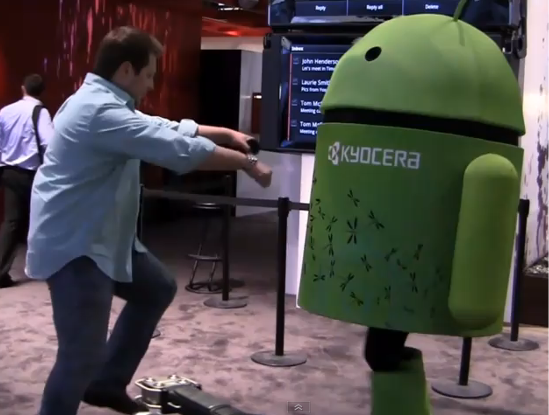
The first quarter of 2011 made it the second quarter in a row that Android was the top mobile platform in the world. Rising from one phone on a single carrier in 2008 to hundreds of devices on carriers all around the world, Android has spread like a wildfire around the globe. Currently residing atop the global market share, gobbling up 35 percent (up 2.1 percent from last quarter), Android doesn't appear to be going anywhere anytime soon, and they seem to be leaving the competition in the dust.
But this market is all about the rise and fall – not that I'm implying Android will fall, but think back to roughly 2006. RIM dominated the US market and we assumed that it would stay that way for quite some time. Fast forward one year and Apple's iPhone changed everything. Here we are in the present and RIM is still steadily losing market share in the US. Though the giant's walls seemed impenetrable, they were just as mortal and susceptible to a crash as any other platform and company out there.
Several analyst firms have tried their hand at predicting what the future of the mobile industry may look like, but these efforts are futile at best. If nothing were to change (i.e.: major changes in the design of phones, OS updates, carrier buyouts/mergers, etc.), we could make a very accurate guess at what we may see three, four, maybe even five years into the future.
But how often do we go as much as a week without something major happening in the mobile industry? Quite frankly, I don't care about the little things that may happen between now and 2020. Instead, I'm interested in what mobile platform could possibly pose a threat to Android in the future.
Google's true competition at the moment is undoubtedly Apple. While it does have the potential to grow some with the next generation of devices and next iteration of iOS, there is only one manufacturer making iOS devices. This acts as a limiting factor. There are at least nine major manufacturers making handsets for Google's platform and five producing handsets for Windows Phone 7, which gets me to my next point.
Windows Phone 7, while it is a nice platform and has rather impressive development support, just doesn't seem to be gaining as much traction as we thought it would. It has potential, especially if the next update goes as smooth as promised by Microsoft and if it spices up the UI a little. But what truly gives Windows Phone 7 the edge is the big deal they made a few months ago. As much pull as Nokia has globally, Windows Phone 7 definitely won't be going anywhere. But it won't spread quite as quickly or frantically as Android did. I assume more people, namely Nokia loyalists, will default to Nokia's next operating system.
If HP would put a little more focus on phones rather than tablets or PCs, webOS would probably pose the biggest threat to the little green robot. The UI is exceptionally intuitive and fun to use. It also makes multitasking a breeze, of which neither Android or iOS can even begin to compete with. Again, with only one manufacturer producing phones, there is a limiting factor. But if HP's plan to equip all PCs in 2012 works as planned and their tablet isn't a complete flop, the webOS ecosystem could be a serious contender.
Last but certainly not least is RIM. At the moment, their BlackBerry platform is dated, slow, and quite frankly, boring. But they have made some serious acquisitions over the past year. When all of these acquired companies are brought together, you can be sure that their counterparts are probably getting a little worried. Not to mention, RIM has experienced outstanding growth globally over the past year. With the assumed ability to run Android applications with the same, exquisite email experience, the QNX software could have what it takes to pull RIM back up to the top.
All things considered, Android will reign for at least a few years to come. In that time, the market is sure to vastly change as we're seeing new concepts, software and technology enter the mobile space each month. All of these mobile operating systems – and those yet to be determined – will be fighting tooth and nail for their piece of the pie, and every single one of them will be out for Andy's head (poor robot).
Who will steal the crown? It's impossible to know for sure, but my money is on one of the two underdogs: RIM or HP. What say you? Will any of these platforms have what it takes? Who do your have your money on or who will you be rooting for?